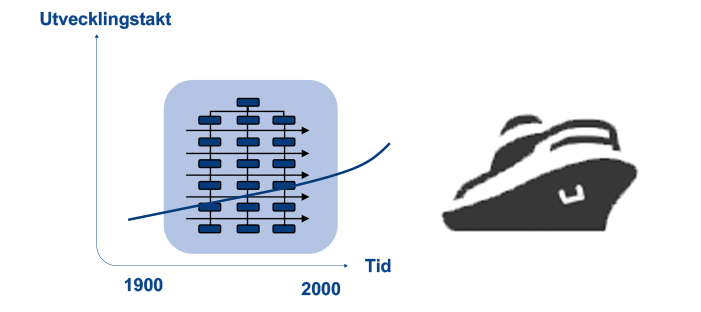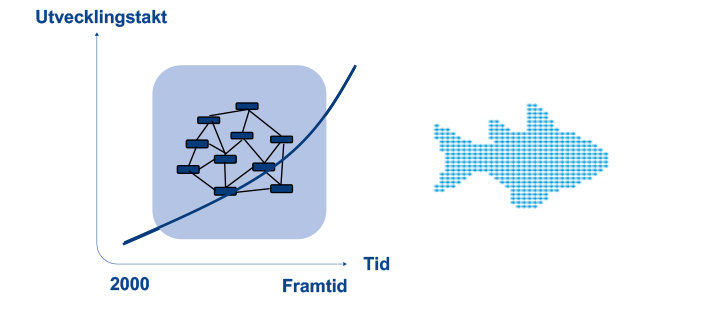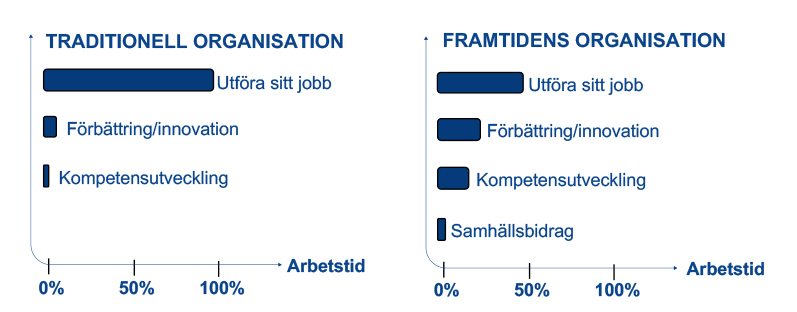Recent studies show that today's management models make organizations sluggish in relation to the surrounding pace of development and, in addition, employees and leaders are increasingly unhappy in the workplace! See SIQ's study on Organizations' main challenges for the next five years and the latest measurement in the Swedish Quality Index national employee survey.
Today, we still organize our organizations in much the same way as was established during the industrial revolution, finding departments and functions with specialist skills in defined areas, often led by a manager/leader who is something of a specialist in the field rather than a coaching leader.

Sometime around the 1980s, people began to realize that it could be of interest to clarify organizations' processes and flows, across an organization and concepts such as process management emerged. After all, it is for the customer that an organization exists!
The result today is often quite complex organizational forms with mixtures of functions and processes and in the middle of these intersections between departments and processes we find the increasingly frustrated employees. This has worked well and those who can simplify this have been successful, but the very pace of change in our environment means that new principles for how we lead and manage organizations need to be developed.
All staff have three jobs or roles
Basically, and perhaps simplistically, all of us employees have basically three different jobs or roles;
- You have to do your job.
- You should work on improving, developing and innovating how the job is done.
- You should work on your own skills development.
I often give talks on these issues and usually ask how much of your working time is spent on each of the jobs listed above. It never fails! Almost always, most people say that they spend 99% of the time, if not even overtime, working to perform their job in the way they have long worked out. There is rarely time for improvement and innovation in the way you work, although you often have ideas about what you should do and change, and all too often the ambitions of the performance appraisal regarding skills development end up with finding a suitable course to "squeeze in" alongside doing your normal job. A course that then turned out to be fully booked or that you didn't really have time for. This has become the norm - how did it happen?
Most people say that 99% of their working time is spent doing their job in the way they have worked out for a long time.
Indeed, in an era of industrial revolution, it was quite logical to divide work into smaller steps where employees could easily be trained for these roles and defined tasks. Given a fairly incremental pace of development around technology and surrounding competing businesses, success came from optimizing and refining the execution of these often carefully chiseled and given roles around functions and processes.

The same organizational models exist
Time has passed and while most organizations lead and manage as they have done in the past, the pace of development in our environment has increased enormously! No wonder that the facts show that employees are finding it increasingly difficult to keep up, partly locked in old obstructive structures. The time is long past when the manager and the leader were more knowledgeable and authoritatively would show the way. Today, most people in an organization often have as extensive a basic education as the leader and at the same time, through new digital technology, access to the same extensive information about what is happening both within the organization and the surrounding world.
At the same time, there are organizations that manage to be agile and grow rapidly, attracting the best of the best employees! It is partly in studies of how these organizations work and organize themselves that we find the ideas for tomorrow's management models. One reflection that has struck me is that these fast-moving and successful organizations often have a different way of approaching the task of the three jobs that everyone has and that I describe above. They have dared and succeeded in changing the proportions between the three jobs of all employees!
This seems to be partly where the key to success lies! There it is obvious that you do your job, but it is equally obvious that you have organized and planned for time to work with improvements and innovations in large and small and that everyone is committed to this work. Similarly, in these organizations it is natural and obvious that you spend a large part of your time on your own competence development, far beyond participation in small courses here and there. The really successful organizations have even realized that all employees have a fourth job, namely to be offered the opportunity to contribute their skills to the surrounding society in an appropriate way, and this within the regular working hours!

So if an opportunity for success lies in the change of time allocation and focus on the different jobs you have, why don't all organizations just change this? Well, it's easier said than done! At the same time, we live in a quarterly capitalism where organizations must constantly deliver short-term results and then it is safe to keep the majority of employees performing their basic job and possibly refining it a little given today's boundary conditions. I still think that some kind of Darwinian effect will probably solve this in the long run. Those who stick to and stubbornly optimize the business given today's conditions will be overtaken by others sooner or later. At the same time, the organizations that succeed in redistributing the tasks of all employees according to the three, maybe four, jobs I describe above, will attract the best of the best employees and thus become even more agile with committed employees who constantly develop and take the next step - a winning team!
I still think that some kind of Darwinian effect will probably solve this in the long run.
Natural "time out" years?
Perhaps we also need to partially address this challenge at a societal level and, like the pension system we have, develop a similar skills development system, where colleges and universities were not just something you went to when you were young, but something where it is quite natural to take "time out" for a year sometimes to concentrate fully on your third job, your own skills development. In order to then be able to contribute to development in perhaps completely different roles, possibly even in other organizations.
Management and governance have always had to be adapted to the needs and situations of society and now, to return to the studies I referred to at the beginning, we have simply fallen behind. It is high time we developed these future forms of organization as soon as possible. Some organizations have already partially done so, and they are tomorrow's winners!
What do you think?

With kind regards,
Mats Deleryd, CEO, SIQ
mats.deleryd@siq.se
